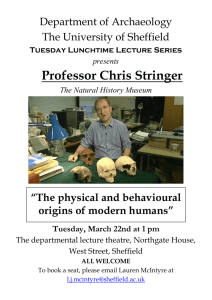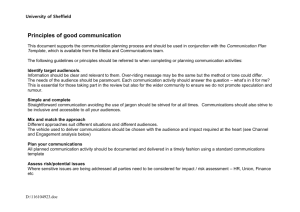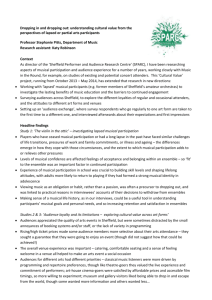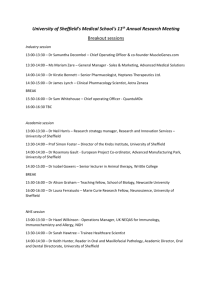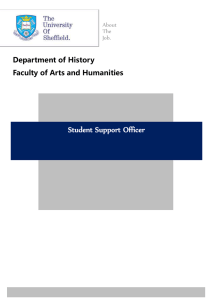Research Assistant (AHRC Cultural Value project) Department of Music
advertisement
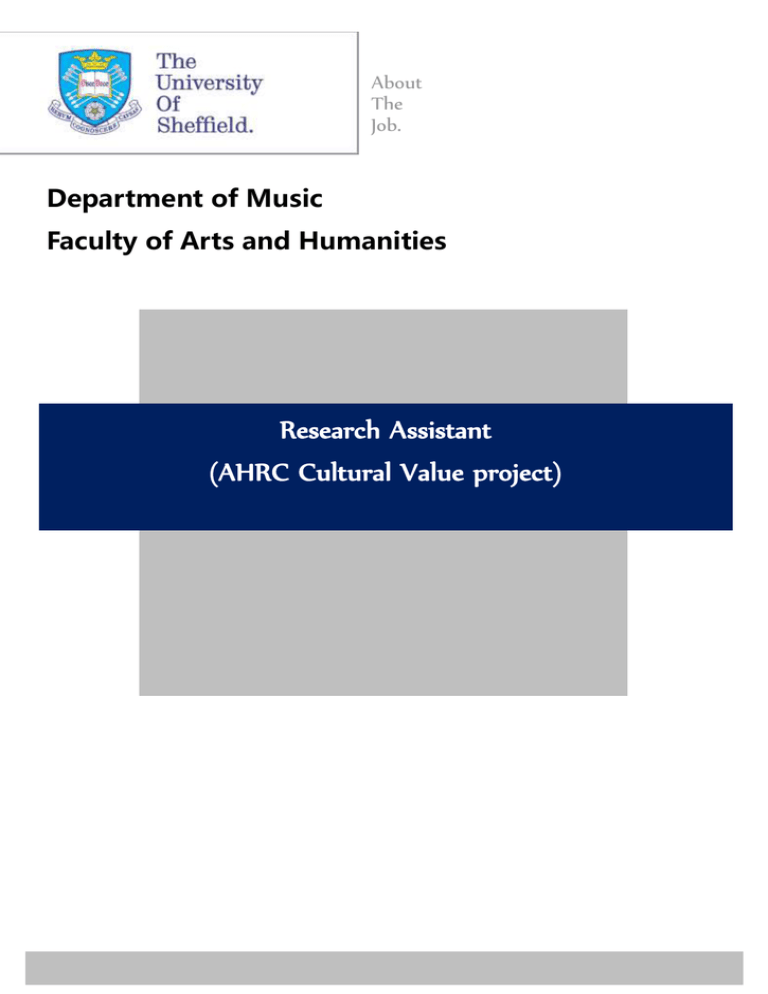
About The Job. Department of Music Faculty of Arts and Humanities Research Assistant (AHRC Cultural Value project) About The Job. Pursue the extraordinary Overview About the Department The Department of Music is one of the largest and most vibrant academic music departments in the UK, covering musicology, performance, ethnomusicology, composition, psychology of music, music education and music technology (http://www.sheffield.ac.uk/music). It is also one of the strongest in research, ranking joint 4th in the 2008 Research Assessment Exercise. 45% of research was deemed ‘world leading in terms of originality, significance and rigour’ and a further 35% ‘internationally excellent’. Psychology of music is a particular specialism and the department is host to two research centres, including the Sheffield Performer and Audience Research Centre (http://www.sparc.dept.shef.ac.uk/), to which this post will contribute. Job Role The post-holder will be funded by the AHRC’s Cultural Value programme, through a grant awarded to explore ‘Dropping in and dropping out: understanding cultural value from the perspectives of lapsed or partial arts participants’. Three linked studies will take place as part of the project, for which the post-holder will be required to recruit participants, carry out data collection and transcription, and contribute to analysis, writing and dissemination: Study 1: The violin in the attic - investigating lapsed musical participation This study will focus on amateur musicians, exploring the experiences and attitudes of those who no longer play, and who commonly cite pressures of time, family, and work as having caused them to cease involvement (Pitts, 2005; 2012). Through in-depth interviews with around 30 'lapsed' members of musical groups, this study will explore how the benefits and costs of musical participation are articulated by those who no longer actively participate, and will identify the factors in causing participants to cease their involvement. These findings will shed new light on cultural value as perceived by those who have other priorities in their lives, and will help to propose strategies for retaining and re-engaging such people as active participants. Study 2: Loyalty and its limitations - exploring cultural value across art forms This large-scale questionnaire study will explore the articulation of cultural value across genres, by questioning those who attend a narrow range of arts events about their experiences of their chosen genre, and their broader understanding of arts in society. Responses will be sought from audiences in a range of venues, including independent cinema, theatre, concert halls and museums; each will be asked about their frequency of attendance, factors in choices of events, openness to other art forms, and attitudes towards less familiar arts. The study will therefore highlight any differences between the attitudes and experiences of audiences at specific arts events - and so shed light on whether 'cultural value' is generic to arts engagement, or needs to be more subtly defined for different audiences. Study 3: Cultural value in lives and localities This study will return to the in-depth interview approach used in Study 1, so allowing for comparisons between lapsed arts participants and occasional arts attenders, as well as deepening the evidence from Study 2 with a closer exploration of how attitudes and patterns of engagement are formed in adult life. Around 30 volunteers from Study 2 will be interviewed using a life history approach (cf. Pitts, 2012) to explore their level of past engagement, and how this has shaped their perceptions of the contribution of the arts to their life and to the local community. This study therefore offers another perspective on the factors that promote and inhibit involvement in the arts, and on the articulation of cultural value that surrounds those participation decisions. Job Description Main Duties and Responsibilities Understand and develop the research brief in line with the aims of the AHRC Cultural Value project. Recruit and arrange interviews with participants for the three empirical studies outlined above. Manage the online survey for Study 2, downloading data regularly and storing it securely in line with ethical research policy. Carry out one-to-one interviews and transcribe the recordings for analysis. Engage in the research aims of the project through relevant reading and contributions to the analysis of data. Contribute to the research culture in the department, through attendance at psychology of music group meetings and research seminars. Contribute to the dissemination of the project through jointly-authored publications and presentations. Any other duties, commensurate with the grade of the post. Person Specification Applicants should provide evidence in their applications that they meet the following criteria. We will use a range of selection methods to measure candidates’ abilities in these areas including reviewing your on-line application, seeking references, inviting shortlisted candidates to interview and other forms of assessment action relevant to the post. Criteria Essential Desirable Qualifications and experience 1. Have (or be completing) a Masters degree in Music or another X relevant subject, to include training in research methods (or equivalent experience). 2. Experience of carrying out and writing up empirical research in X Music or a related area. 3. Knowledge of and interest in arts engagement and/or audience X development and related research. 4. Experience of interacting with audiences, perhaps through volunteering or working for an arts organisation. X Management skills 5. Experience of project development, management and delivery. X Communication skills 6. Effective communication skills, both written and verbal, and the X ability to adapt communication methods to suit the needs of varied audiences. 7. Experience of working in a public-facing role, and responding X efficiently and effectively to enquiries. Team working 8. 9. Experience of working collaboratively with a wide range of X participants. Willingness to engage in mentoring and discussion with other X researchers within and outside the team. Supporting staff performance 10. 11. Ability to review progress and performance using appropriate X evaluation, monitoring and reporting methodologies. Ability to motivate high performance in others. X Problem solving and decision making 12. 13. Ability to develop creative approaches to problem solving X Ability to identify and manage risks as part of own work area. X Project management 14. Ability to assess and organise resources, and plan and progress X work activities (time management). Personal effectiveness 15. 16. Ability to develop and maintain a network of contacts X throughout own work area. Experience of adapting own skills to new circumstances. Further Information X This post is fixed-term for 8 months and available with a start date of 1st October 2013. This post is part-time: 14 hours per week. Working pattern to be agreed with line manager. Benefits Terms and conditions of employment: Will be those for Grade 6 staff. Salary for this grade: £24,049 per annum, pro-rata. More details on salaries, terms and conditions and our wide range of benefits for staff are available at www.sheffield.ac.uk/hr/reward/structures Informal enquiries: For all on-line application system queries and support, contact: e-Recruitment@sheffield.ac.uk . For informal enquiries about this job and department, Selection-Next Step Following the closing date, you will be informed by email whether or not you have been shortlisted to be invited to participate in the next stage of the selection process. Please note that due to the large number of applications that we receive, it may take up to two working weeks following the closing date before the recruiting department will be able to contact you. The University of Sheffield is committed to achieving excellence through inclusion. The University of Sheffield is proud to be a Two Ticks employer www.sheffield.ac.uk/hr/equality/support/twoticks/ Pursue the extraordinary


